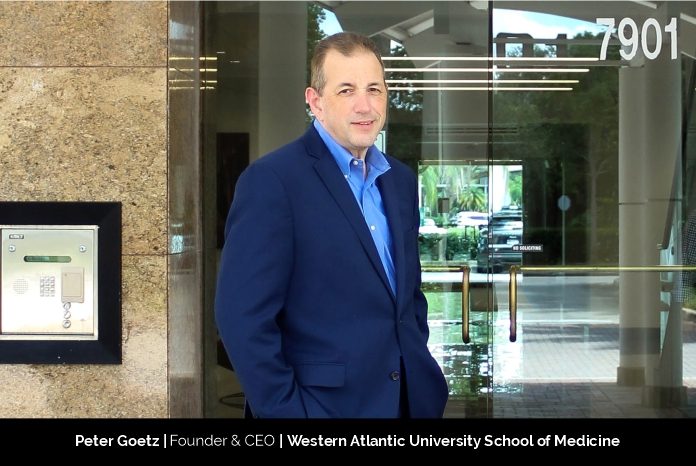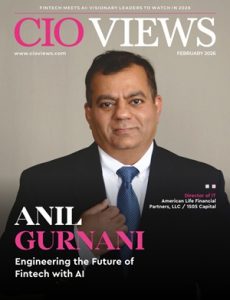In the United States today, there are only 150 medical schools that confer the medical doctor degree, with about 53,000 students applying to those schools for only about 22,000 available seats. What this boils down to is that 30,000+ applicants annually are denied entry to medical school in the US not because they lack the qualifications, but simply because there are not enough available seats.
Peter Goetz, founder of Western Atlantic University School of Medicine (WAUSM), is making a big difference in the sector. He established WAUSM to both provide deserving students with the opportunity to attend medical school, and help alleviate the impending physician shortage. There is a current US shortage of 30,000 physicians that is projected to grow up to 124,000 by 2034.
WAUSM is located in the Western Atlantic Ocean, hence its name. The University’s tagline, “A medical education above,” is a double entendre: its ideal location is well north of the Caribbean region where the school’s competition is located, and it boasts an outstanding leadership team that delivers a world-class education. The team states, “We constantly strive to elevate ourselves above the competition.”
An Established Career in Higher Education
Peter’s career focus has always been within higher education. He began his career as an admissions counselor at Ramapo College of New Jersey when he was 21 years old and worked his way up there for 17 years, receiving promotions roughly every three years. He opines, “I’ve always enjoyed showing young professionals my resume because when you look at it you see the progression that occurs from hard work, not immediate gratification. After several promotions, I was elevated to the roles of dean and then vice provost for enrollment management.” Following that post, he applied to Ross University where he worked for 11 years and enjoyed tremendous team success before concluding that he had done as much as he could helping to lead one of the world’s largest medical schools. He decided it was time to try something new, which is when the idea of establishing a medical school really took root.
He finds himself fortunate that he has had many great moments as a leader, but among them, the fondest occurred when he first began thinking about launching WAUSM. He recalls, “When I first talked with Dr. Flaherty [Joseph Flaherty, MD, president of WAUSM and dean emeritus at both the University of Illinois College of Medicine and Ross University School of Medicine], I expected him to say something supportive to me, but also to be straightforward by saying something like, “Are you crazy? Do you really want to take this on?” But this wasn’t the case at all as he immediately said, “I’m in.” I received nearly the same response from others with whom I spoke. This made me proud because there was this collective, singular belief that what we are creating at WAUSM will be nothing short of an extraordinary success.”
The CEO of WAUSM
Peter is an extremely competitive person. He enjoys winning, but dislikes losing much more, and he notes, there is a distinction. It’s a mindset, and he feels it’s what motivates him: the will to achieve and not give up until he finds a way to accomplish the task(s) at hand, even when difficult, and even near impossible hurdles, stand in his way.
He says, “As a leader, you’re being watched all the time, so you have to keep yourself razor-sharp, focused on the big picture, and ensure your team (or if not them, then you) are handling the most minute details as well.”
Peter notes that at the helm of WAUSM is an established team that has worked successfully together for an extended period at previous medical institutions, which is why WAUSM is so strong. He says, “Everyone is willing to check their egos at the door and truly trust one another. From here, the equation is rather simple: Talent + Trust = Greatness.”
Challenges that Push Toward the Betterment
According to Peter, WAUSM should be in its second year of operations, were it not for two major hurdles. The first was in 2019 when Hurricane Dorian devastated Freeport, Grand Bahama, the home of WAUSM’s preclerkship campus. Many organizations might have looked for a new location after such an event, but WAUSM felt even more attached to Freeport for this very reason. He says, “We believed it was important to not cut and run, but instead to be a part of the ‘renaissance’ that is occurring in Freeport by being the first major business, or university in our case, to be established on Grand Bahama Island post-Dorian.”
And then, of course, once WAUSM got past the hurricane, the pandemic hit, so that cost it another year, mostly because of the travel restrictions in place that meant the management team couldn’t be there physically to build out its campus.
“But what these hurdles did was put things into perspective. We were able to swiftly navigate past other, minor everyday hurdles that we otherwise would have thought were significant had we not now known better. These setbacks also made us even more resolute to press forward,” says Peter.
‘Work-Life Balance’ is Essential
Several years ago, Peter learned an important lesson regarding work-life balance. When one of his direct reports approached him about another matter, the conversation turned to personal time off and, more specifically, the example Peter was setting when he took time off. He recalls, “This person told me that my team would do anything for me, but that it was hard for them to truly disconnect from work when they were on vacation because, even though I told them to do just that, I wasn’t doing it myself.”
In other words, Peter was talking the talk, but not walking the walk. This incident taught him that one does need to create work-life balance because it is critically important to recharge your batteries, and that he had to show others that it could be done. Peter did just that, and continues to carve out time when he can not only for his family and closest friends, but also for things that he enjoys, such as sports and reading.
Becoming the Best Medical Education Provider
Peter wants to excel WAUSM’s place as a newcomer in international/Caribbean medical education to a leader in the field; the medical school closest to the US (just 60 miles from Florida) and the category’s star. He asserts, “Our short-term vision is to very quickly be thought of as equal to the schools that have been established for 40+ years; the longer-term vision is to be seen as the No. 1 medical school in our space.”
As per Peter, there are so many things the school can do to make itself not just the best educational institution, but the best medical education provider by being open and compassionate to all students.
Peter is also passionate about growing the school in a responsible way; not growing for growth’s sake, but doing so properly by ensuring that all necessary resources are in place. He says, “The overriding goal is to be a best-in-class medical school and do our part to help fill the significant projected US physician shortfall.”
Good Leadership Recognizes Team Success
Peter’s definition of success is not about individual achievement, it is collective; team all the way. He opines, “Too many times, people feel a need to micromanage, and at times while I may do so, I make a conscious effort to avoid doing this as much as possible. Outstanding leaders hire great people, the best in their respective fields. They are there to support them, and then get out of their way.”
Successful leaders aren’t afraid to hire people who are dissimilar to themselves or have skills different from their own; in fact, they embrace this concept. According to Peter, “You should hire people who will complement, counterbalance, and help you and your organization in ways that will make the enterprise stronger. It’s important to feel secure in your own skin and hire a diverse workforce of people to build, or create, winning teams and extraordinary organizations.”





